Directions (1-5): Please understand the data carefully and answer the following questions.
The following table shows the data of five different shops, A, B, C, D and E, having two different variants of phones i.e.,4 GB RAM and 6 GB RAM phones.
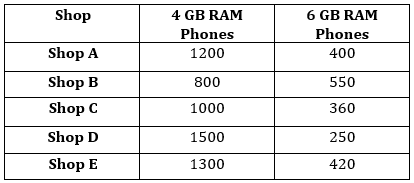
Q1. If shop C also have ‘n’ number of 8 GB RAM phones which are 25% of 6 GB RAM phones of shop E, then find the value of 3n-95?
(a)250
(b)210
(c)220
(d)190
(e)170
Q2. Find the respective ratio of number of 4 GB RAM phones of shop A to the number of 6 GB RAM phones of shop C?
(a)10: 3
(b)9: 4
(c)13: 5
(d)3: 10
(e)4:9
Q3. Find the number of 4 GB RAM phones of shop D is what more/less than the number of 6 GB RAM phones of shop B & C together?
(a)620
(b)590
(c)550
(d)570
(e)630
Q4. Find the difference between the total number of 4 GB RAM phones from shops B & D together and number of 6 GB RAM phones of all five shops together?
(a)260
(b)300
(c)340
(d)280
(e)320
Q5. Find the number of 6 GB RAM phones of shop A and D together is what percent more/less than the number of 4 GB RAM phones of shop E?
(a)40%
(b)25%
(c)75%
(d)50%
(e)100%
Directions (6-10): Please understand the data carefully and answer the following questions.
The bar graph given below shows the distribution of families under two categories, Above poverty line and below poverty line in lakhs, from five different district of state X in year 2020.
Note: Total families=Families above poverty line+families below poverty line
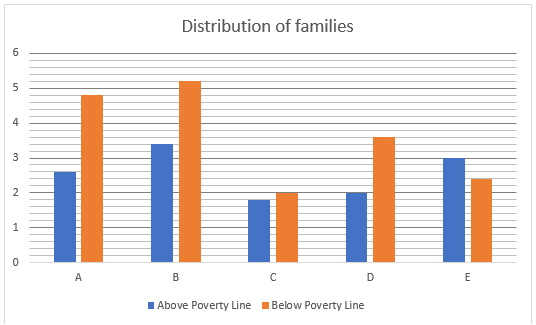
Q6. Find the number of families which are below poverty line from district E are how much more/less than that are above poverty line from district A?
(a)0.2 lakhs
(b)0.3 lakhs
(c)0.5 lakhs
(d)0.8 lakhs
(e)1 lakh
Q7. Find the respective ratio of the number of families which are below poverty line from district B to the total number of families from district C?
(a)21: 17
(b)26: 19
(c)17:21
(d)19: 26
(e)19: 17
Q8. If in year 2021, 20% of the families which are below poverty line from district D in 2020 are registered under above poverty line category, then find the number of families which are above poverty line from district D in year 2021?
(a)2.56 lakhs
(b)3.02 lakhs
(c)2.62 lakhs
(d)2.96 lakhs
(e)2.72 lakhs
Q9. Find the number of families which are above poverty line from district C are what percent more/less than the number of families which are above poverty line from district E?
(a)60%
(b)20%
(c)50%
(d)40%
(e)30%
Q10. Find the average number of families which are above poverty line from all five districts together?
(a)2.32 lakhs
(b)2.64 lakhs
(c)2.56 lakhs
(d)2.44 lakhs
(e)2.12 lakhs
Directions (11-15): Please understand the data carefully and answer the following questions.
The following bar chart shows the number of peoples in thousand using two different network operator, Airtel and Vodafone, in five different colonies, A, B, C, D and E.
Note: Each people use only one mobile operator, either Airtel or Vodafone.
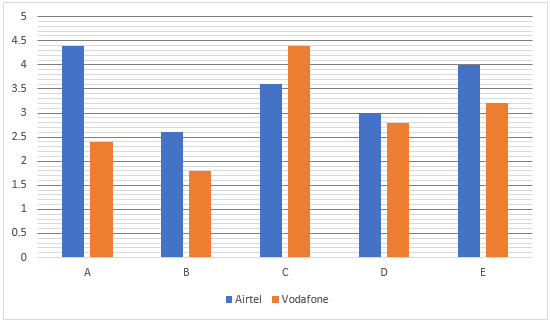
Q11. Find the number of peoples using Airtel in colony C are what percent more/less than the number of peoples using Vodafone in colony B?
(a)100%
(b)50%
(c)120%
(d)80%
(e)40%
Q12. Find the respective ratio of the number of peoples using Airtel in colony D & E together to the number of peoples using Vodafone in colony A?
(a)12: 35
(b)11: 24
(c)24:11
(d)12: 11
(e)35: 12
Q13. Find the number of peoples using both networks in colony C are how much more/less than the number of peoples using both networks in colony E?
(a)1000
(b)400
(c)1200
(d)800
(e)600
Q14. Find the difference between the total number of people using Airtel and that using Vodafone in all five different colonies together?
(a)2000
(b)3000
(c)1000
(d)4000
(e)5000
Q15. Find the number of peoples using Vodafone in colony E is what percent more/less than the number of peoples using network operator (Airtel & Vodafone) in colony C?
(a)100%
(b)40%
(c)60%
(d)80%
(e)20%
Solutions
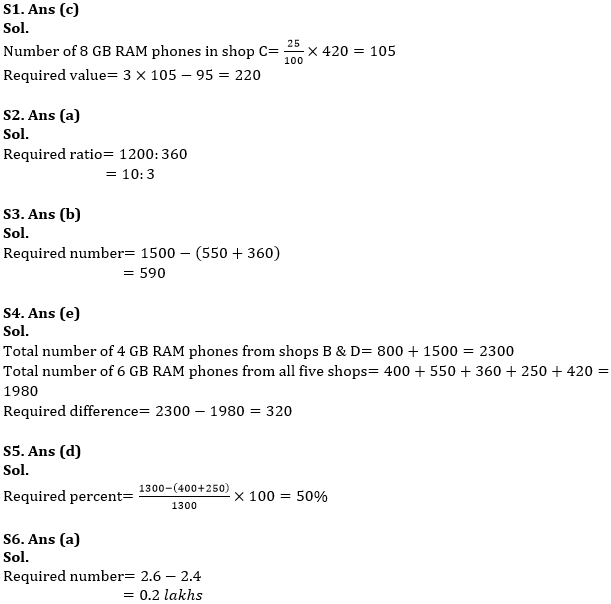
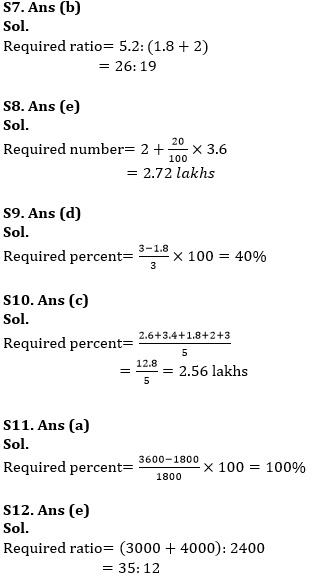
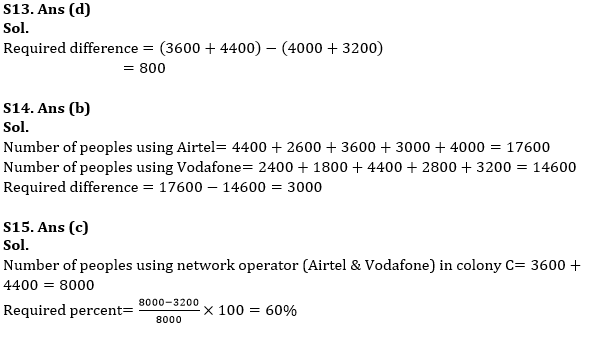



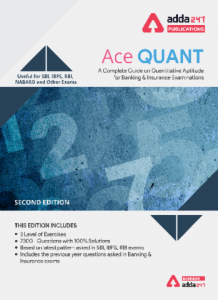

 Simplification Questions for SBI PO Exam
Simplification Questions for SBI PO Exam
 SBI PO Quantitative Aptitude 2025, Impor...
SBI PO Quantitative Aptitude 2025, Impor...
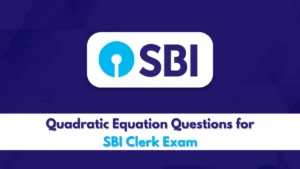 Quadratic Equation Questions for SBI Cle...
Quadratic Equation Questions for SBI Cle...







